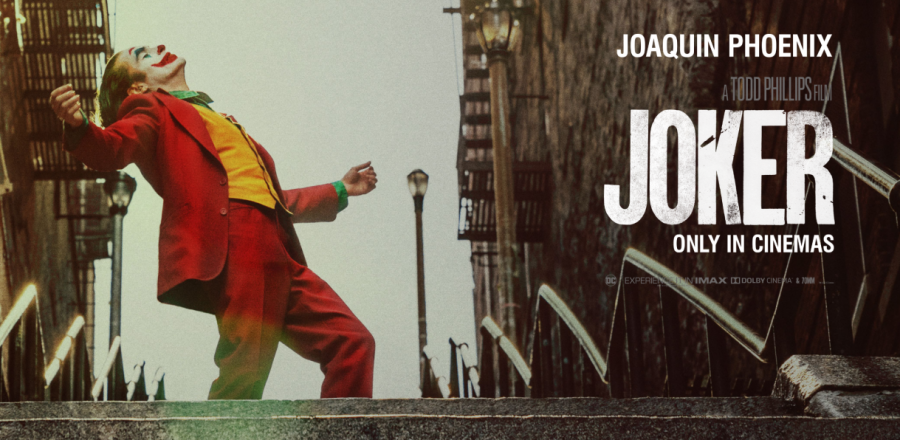DC Comics introduced a darker universe and a bone-chilling new “Clown Prince of Crime” with the release of “Joker.”
The film broke box office records in its opening weekend, making it Warner Bros’ biggest hit this year, as well as one of the most notorious R-rated films for an opening weekend, making a whopping $234 million worldwide.
The motion picture film featured “Walk the Line” actor, Joaquin Phoenix as Arthur Fleck, a clown-for-hire by day who tries to function normally under a regular dose of pills, while he cares for his sick mother.
In the movie, Fleck suffers from a neurological condition that causes him to burst out in painful and uncontrollable laughter during the worst possible times. Fleck aspires to be a stand-up comedian someday, so he keeps track of his jokes in a notebook, where he also scribbles pornography.
Phoenix’s awestriking performance joins the league of Jack Nicholson, Mark Hamil, Heath Ledger and Jared Leto, who each brought their own facade and approach to the Batman nemesis. In Phoenix’s depiction, the Joker wears a peculiarly different mask: the mask of humanity.
It is a disturbing portrayal of a normal human being who has suffered mental trauma and initially tries to simply be “good” to get through the day in the treacherous city of Gotham.
The film does not follow any comic storyline since the Joker character has different origin stories, but it is not completely disconnected from the comics.
Although Batman is not an essential character in the new film, Bruce Wayne was cast as the young son of Thomas Wayne, billionaire and mayoral candidate of Gotham City.
Fleck feels abandoned by society and this catalyzes his transition into the infamous archnemesis of Batman, the antihero symbol for the downtrodden.
Viewers of the unsettling movie have urged cinemas to ban the film, claiming that it glamorizes gun crime and mental health issues, according to Daily Mail.
Warner Bros defended the film by stating, “Make no mistake: Neither the fictional character Joker, nor the film, is an endorsement of real-world violence of any kind.”
Phoenix and the director of the film, Todd Phillips, also defended the film, trusting that audiences know the difference between right and wrong.
“I really liked it, especially how they incorporated parts of previous versions of the Joker; Heath Ledger’s anarchy and face-painting; Mark Hamils’ quick wit and funny remarks; Jack Nicholson and Heath Ledger with having kind of a mafia behind them,” said Rene Ochoa, a UTEP senior studying electrical engineering who saw the screening at the Alamo Drafthouse. “Another thing they incorporated well was the Killing Joke by Alan Moore, where they mention that you can have one bad day and fall down this rabbit hole and become a ‘bad’ person.”
“What Joaquin Phoenix did amazingly was portray that he was a mental patient, that he had problems but was trying to get help. Then it all starts spiraling down for him and he tried to find sources of happiness within his mind but at the end of the day he couldn’t find it, until he saw an outlet in which he became this symbol of anarchy,” Ochoa said. “He held on to it because that was what he wanted, to be appreciated some way and it’s what a lot of people are looking for.”
Local artist Joey Lee Cabral, 34, was also at the film’s premier at the Drafthouse.
“The movie was amazing. DC did what it does best, a character–driven story,” said Cabral, who was also selling his artwork at a table booth at the Drafthouse entrance. “For my piece, I tried to capture the lonely and depressed version that the trailer portrayed him to be. I’d love to tackle another one with joker fully embracing his new self.”
Like previous Joker actors such as Ledger, who locked himself away in a London hotel room for about a month to channel the character, Phoenix sacrificed part of himself to portray the Joker in his own light.
Phoenix said playing the character left him as a “starving recluse,” as he mentally and physically embodied the clown prince by starving himself, with a reported loss of 52 pounds.
“You start to go mad when you lose that amount of weight in that amount of time,” Phoenix told Daily Beast.
The film takes on a contemporary approach by allowing the audience to project their own meaning onto the film. It focuses on its psychological aspect by showcasing real-life struggles and what isolation, unconfronted trauma and impotent rage can do to a person’s mind.
Jaqueline Martinez may be reached at prospector@utep.edu.










